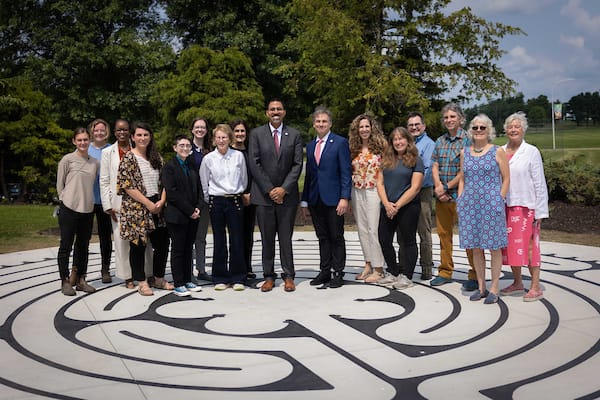State University of New York Chancellor John B. King Jr. today joined SUNY Sullivan President David Potash, Assemblymember Aileen Gunther, program leaders, and mental health counselors to discuss and celebrate SUNY Sullivan’s expanded healthcare workforce training and investments in mental health resources for students on campus.
As part of the State of New York’s 2024/25 Enacted State Budget, SUNY’s 30 Community Colleges received $8 million in additional Direct State Tax Support, the first increase in such funding in almost ten years. From this investment, SUNY Sullivan is enhancing its medical assistant and respiratory care programs, building a polysomnography microcredential, and supporting onsite healthcare credential exam testing. A total of $175,000 will be utilized for this program growth, as well as investing in student mental health support.
“Community colleges are engines of economic mobility, and we are committed to supporting our students and preparing the future workforce. SUNY is grateful to Governor Kathy Hochul and the Legislature for investing $8 million in additional community college operating support, which is expanding the healthcare workforce and providing mental health support to our students,” said SUNY Chancellor King. “Today’s visit is a testament to the innovative and deliberate initiatives SUNY Sullivan is leading, and we are excited to support this work to ensure the SUNY Sullivan community has the resources it needs to address mental health challenges and support the overall well-being of our students.”
SUNY Sullivan President Potash said, “SUNY Sullivan is thrilled to embark on this new chapter of collaboration with the State University of New York system. We are expanding opportunities for our students in healthcare programs while also enhancing our collective ability to provide mental health support. Working together with community partners like The Center for Discovery, we will shape a brighter future.”
Assemblymember Aileen Gunther said, “During my tenure representing District 100, I have remained committed to increasing access to health care and mental health services. As a member of the Assembly Health Committee and Chair of the Assembly Mental Health Committee, I have a deep understanding of the challenges New Yorkers face, particularly in Sullivan County. I am delighted that SUNY and Sullivan County Community College, with the help of Sullivan 180 and federal funding, are taking a proactive role in addressing these growing crises by expanding their medical programs and investing more in student mental health support. I am confident that these efforts will have a lasting impact on our community and the state as a whole.”
The Chancellor began his day with a tour of The Center for Discovery and their soon to open state-of-the-art Children’s Specialty Hospital in Rock Hill. The Center for Discovery is a leading educational, residential and research facility for individuals with complex conditions. The Center’s President and CEO, Dr. Theresa Hamlin, who accompanied the Chancellor on his tour, praised his commitment to healthcare workforce training. “One of our greatest assets at The Center is our ability to recruit and retain professional clinical and educational staff. We are a Center of Excellence because of our incredible team. I know Dr. King is deeply invested in providing the highest quality education to students, and I am grateful for his commitment here in Sullivan County and with SUNY Sullivan.”
SUNY Sullivan will be increasing capacity in its patient-facing health programs, including nursing and allied health programs that lead to an associate’s degree, by up to 70 students. This effort is aimed at supporting Governor Kathy Hochul’s goal of increasing the workforce of healthcare professionals in New York State by 20 percent.
As student mental health is a key issue raised by students, faculty, and campus leadership, SUNY Sullivan will increase its investment in student mental health. The new funding will support the onboarding of a new Wellness & Outreach Specialist to lead mental health workshops, expanded professional development for mental health counselors, enhanced mental health programming, and new teletherapy services to students. The campus currently provides personal counseling, psycho-educational programming—including managing stress, coping with depression, and addressing sleep deprivation—and connects students to local community support.
During the visit, SUNY Sullivan unveiled its new Labyrinth, an outdoor, patterned walking path—one of one of three across SUNY’s campuses—which has been proven to reduce stress, alleviate anxiety, and encourage mindfulness for active participants. The Labyrinth is made possible thanks to funding from a School Beautification Grant from Sullivan 180 and the Higher Education Emergency Relief Fund.
The Labyrinth is an outdoor patterned walking path with ancient roots and serves as an interactive and accessible tool to combat stress and anxiety and encourage mindful practices to students, staff, and community members. It features thoughtful landscaping that includes scented plants to enhance the sensory experience for visually impaired individuals. Discussions also focused on the continuation of crucial services on campus, including personal counseling, psycho-education programming and workshops, and SUNY Sullivan’s Behavioral Intervention Team, which works to provide a safe and welcoming environment for all on campus.
About The State University of New York
The State University of New York is the largest comprehensive system of higher education in the United States, and more than 95 percent of all New Yorkers live within 30 miles of any one of SUNY’s 64 colleges and universities. Across the system, SUNY has four academic health centers, five hospitals, four medical schools, two dental schools, a law school, the country’s oldest school of maritime, the state’s only college of optometry, and manages one US Department of Energy National Laboratory. In total, SUNY serves about 1.4 million students amongst its entire portfolio of credit- and non-credit-bearing courses and programs, continuing education, and community outreach programs. SUNY oversees nearly a quarter of academic research in New York. Research expenditures system-wide are nearly $1.1 billion in fiscal year 2023, including significant contributions from students and faculty. There are more than three million SUNY alumni worldwide, and one in three New Yorkers with a college degree is a SUNY alum. To learn more about how SUNY creates opportunities, visit www.suny.edu.

